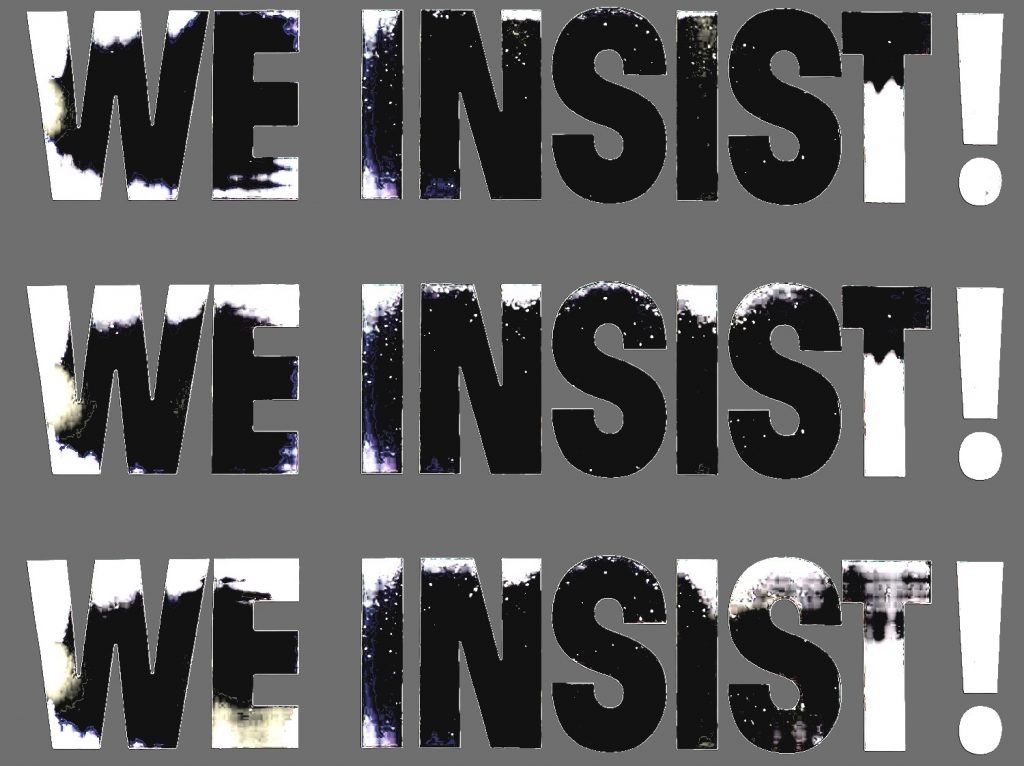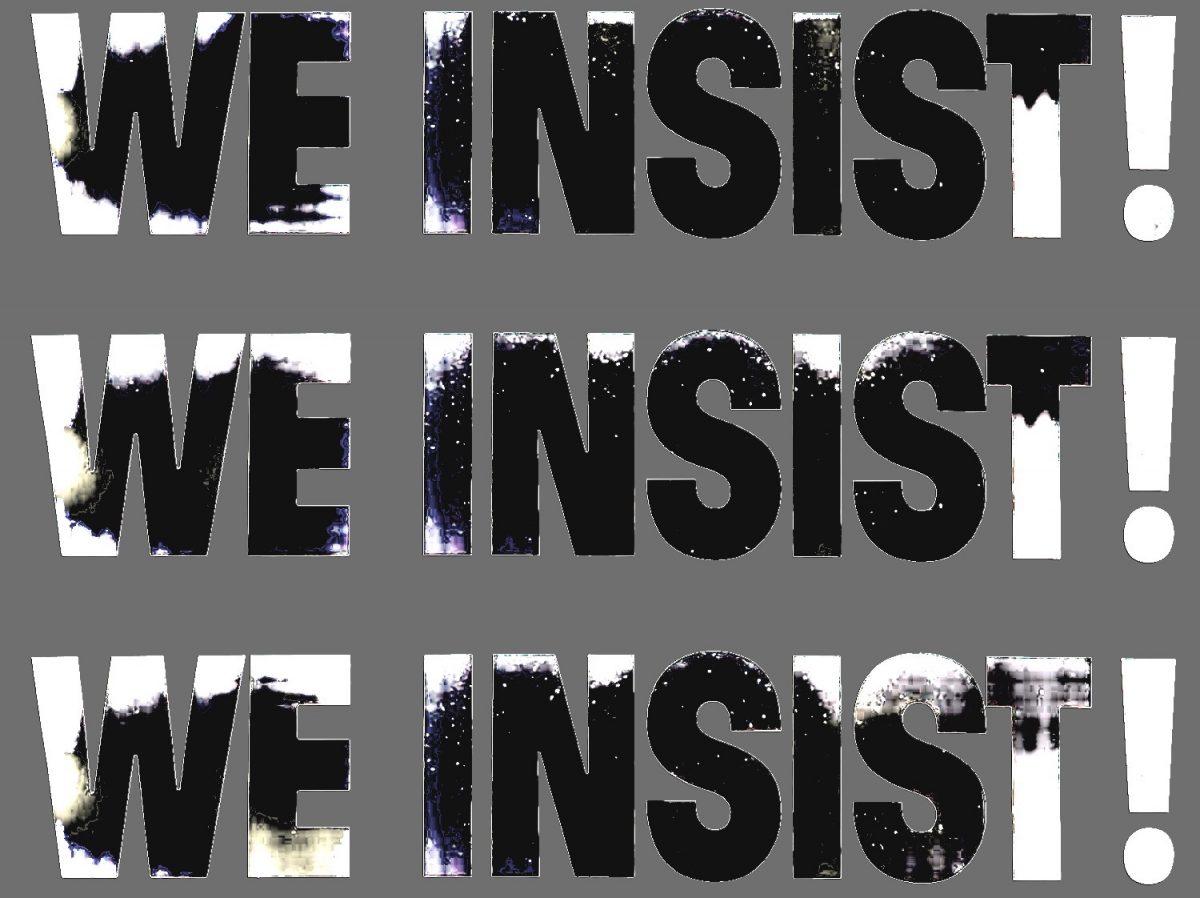
MAGNET’s Mitch Myers is adamant that socially conscious artists be your guide while celebrating classics by Max Roach, Charles Mingus, Nina Simone, Charlie Haden and more!
To be honest, I just couldn’t resist the thought of a We Insist! Playlist!. Then, upon learning that Max Roach’s iconic protest album was being reissued and remembered again, my playful concept felt more like an overt responsibility. So, please consider these strident demands for equality made by valiant jazz and folk artists of the 1960s. Their voices shall not be forgotten—because they weren’t asking, they were telling.
When musician Roach and songwriter/activist Oscar Brown Jr. first conceived of We Insist! Max Roach’s Freedom Now Suite in 1959, they were preparing it for the 1963 centennial of the Emancipation Proclamation. However, the now-famous Greensboro, N.C., lunch-counter protest that occurred in 1960 (and the sit-ins that followed) led Roach to advance the debut of their outspoken work.
Produced by socially devoted music critic Nat Hentoff for his fledgling Candid label, this bold political project showcased an elite gathering of jazz personnel that included drummer Roach, singer Abbey Lincoln, veteran saxophonist Coleman Hawkins, young trumpeter Booker Little and Nigerian percussion master Olatunji.
Make no mistake, theirs was a serious music—expressing justifiable anger and impatience as well as chronicling resistance, triumph and work to be done (in Africa and beyond). The suite progressed through five movements: “Driva’ Man,” “Freedom Day,” “Tryptich: Prayer/Protest/Peace,” “All Africa” and “Tears For Johannesburg.” After recording their landmark document of black history, Roach personally committed to a far greater mandate of consciousness in all of his work.
Bassist/composer Charles Mingus also released a blunt political message on Hentoff’s Candid record label. Mingus had already debuted the song “Fables Of Faubus” on Columbia Records in 1959 but was limited to playing an instrumental version, because Columbia objected to the scathing lyrics of his rebellious composition.
Freed from such concerns with the politically indulgent Candid label, Mingus and his Jazz Workshop band were finally able to articulate their disgust with Arkansas Governor Orval Fabus, who’d used the National Guard to prevent the integration of nine black students into Little Rock High School in 1957.
Besides the inventive discourse of saxophonist Eric Dolphy and trumpeter Ted Curson, the performance highlights a no-nonsense verbal back and forth between Mingus and longtime drummer Dannie Richmond. For this uncensored declaration, renamed the “Original Fabus Fables,” they take notorious racist Fabus to task as well as calling out President Dwight D. Eisenhower, Nelson Rockefeller and the Ku Klux Klan.
Nina Simone first performed her anthem “Mississippi Goddam” at the Village Gate nightclub in New York City, then again at Carnegie Hall in 1964. She claimed that it was her “first civil rights song.” Although it was just the beginning of her social crusade as an entertainer, Simone’s shocking tune still stands recognized alongside her other essential compositions like “Four Women” and “To Be Young, Gifted And Black.”
Not surprisingly, “Mississippi Goddam” was banned in some Southern states at the time. Never mind that it had been written in reaction to the killings of Emmett Till and Medgar Evers as well as the 16th Street Baptist Church bombing in Birmingham, Ala., which took the lives of four black children. Simone performed the song on the Steve Allen television show in 1964, and then again in front of 10,000 people at the “Stars For Freedom” rally near the end of the Selma To Montgomery marches in 1965.
Sis Cunningham and husband Gordon Friesen formed Broadside magazine in 1962. Published in New York City on an old mimeograph machine, their D.I.Y. periodical placed an emphasis on topical songs and was a haven for political songwriters like Pete Seeger, Phil Ochs and Bob Dylan. They put out songbooks and released music, helping to keep the protest movement alive during the 1960s. The Best Of Broadside CD collection offers up what they called, “Anthems from the American underground … A handful of songs about our times.”
If not for Broadside, we might have missed “Burn Baby Burn” by Rev. F.D. Kirkpatrick & Jim Collier. They weren’t famous, but both men were part of the folk-protest scene and associates of Dr. Martin Luther King, who was assassinated in April, 1968. According to Collier, “The struggle had moved from the rural South to become an urban issue. On the fight for freedom, the change had to include economics, and there needed to be a massive payback for slavery.” Collier composed this song after the Watts riots in 1965, and the pair recorded it a couple years later—capturing the mounting anger and frustration that many people were feeling during that time.
Bassist Charlie Haden first made a name for himself as an original member of Ornette Coleman’s quartet. After leaving Coleman and struggling with drug addiction, Haden became musically prolific and formed his first group, the Liberation Music Orchestra, in 1969. Along with arranger/pianist Carla Bley and a cadre of outstanding instrumentalists, Haden conceived of the band as a special project, intended to display unity and give voice to oppressed people everywhere.
The LMO was a formidable vehicle of political expression for Haden, one he returned to repeatedly throughout his life. The group’s first incarnation released a powerful recording in 1970. Brimming with avant-garde sounds and political messages, the album was inspired by Haden’s interest in the volunteerism and bravery observed during the Spanish Civil War of the 1930s. There were also objections to the Vietnam War, which had become controversial during the 1968 Democratic National Convention and prompted Haden to perform “We Shall Overcome.”
“We Shall Overcome” has endured in one form or another for well more than a century. The song began as a black gospel hymn before turning into a worker’s union anthem and then finally becoming associated with the civil-rights movement. Joan Baez sang it in front of 300,000 people gathered at the Lincoln Memorial in 1963, and Martin Luther King recited the words from the song in his final speech on March 31, 1968. This instrumental version by the LMO is less than two minutes long, but you get the idea. Pass it on.






